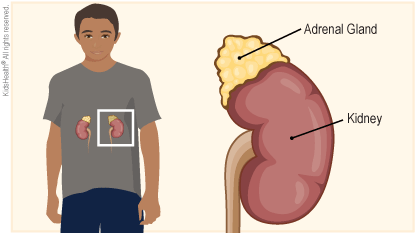A to Z: Adrenal Insufficiency
Adrenal insufficiency is a condition that happens when the adrenal glands do not work properly. These glands, located above the kidneys, make important hormones that help the body handle stress, control blood pressure, and balance salt levels.

More to Know
There are two types of adrenal insufficiency — primary and central:
- In primary adrenal insufficiency, the adrenal glands either become damaged or have a genetic problem that prevents them from working properly. They cannot make enough of the hormone cortisol. Sometimes, they also do not produce enough of a hormone called aldosterone that is needed to control salt balance in the body.
- In central adrenal insufficiency, the pituitary, a small gland beneath the brain, does not make enough of the hormone that triggers cortisol production. This is caused by diseases or problems with the brain or pituitary gland.
A temporary type of adrenal insufficiency also can occur in people who have been treated with high doses of cortisol-like medications (such as prednisone) when the medicine is decreased or stopped.
Keep in Mind
Symptoms of untreated adrenal insufficiency can include fatigue, nausea, abdominal pain, vomiting, low blood pressure, low blood sugar, and darkening of skin color. However, some people with adrenal insufficiency will have no symptoms unless they're exposed to stress.
Sometimes, symptoms can suddenly become much worse, usually when someone is stressed by illness or injury. This is called an adrenal crisis and requires immediate medical treatment, which usually includes additional hormone treatment and fluids given through a vein.
All A to Z dictionary entries are regularly reviewed by KidsHealth medical experts.
